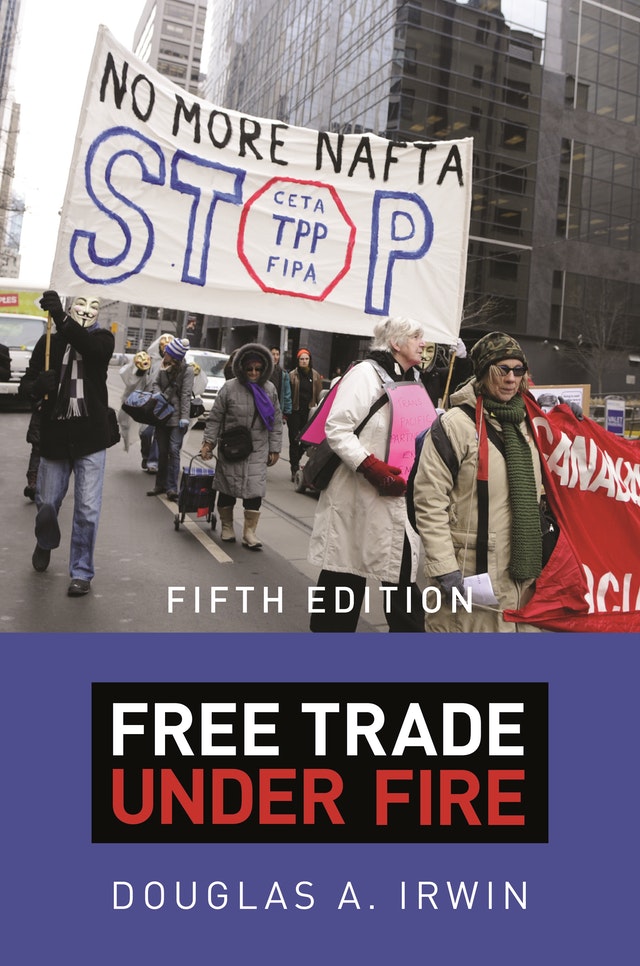Andrei Rogobete: “Free Trade Under Fire – Fifth Edition” by Douglas A. Irwin

“Free Trade Under Fire” by Douglas A. Irwin is, as the title suggests, a book on the debate and defence of international trade. It covers a wide spectrum of (sometimes sensitive) issues on the subject. From national sovereignty and trade policies, to popular misconceptions about trade, the book tackles each argument with considerable depth and backed by evidence.
Douglas Irwin is John Sloan Dickey Third Century Professor in Social Sciences at Dartmouth College. He speaks regularly on trade policy (particularly U.S trade), and writes for various news outlets including the Wall Street Journal, New York Times, and Financial Times.
It perhaps comes as no surprise that the structure and language of the book is somewhat of a hybrid between the academic and ‘professional’ spheres. In parts it reads like a handbook for postgraduate students, while in others it is more opinionated and empirically driven. Regardless, each chapter is well written and considers the various angles of approaching the subject in question.
Therefore, one aim of the book is to “…introduce the reader to some basic economic principles and empirical evidence regarding international trade and trade policies” (page 8). It also seeks to address some of the misconceptions around trade in the “…modest hope that it may improve our understanding of the trade policy issues that confront us” (page 10).
The first and second chapters look at the position of the United States within international trade and evaluates the arguments for free trade. One of the first interesting points that the author makes is highlighting how the impact of international trade is rather blown out of proportion within US public discourse: over 85% of what is consumed in America is produced in America (page 26). Foreign imports therefore only account for less than 15%. Consumption spending is even higher with around 90% being spent on domestic goods (page 27).
A second interesting point emphasises how misguided our perception of the national economic impact of buying imported goods actually is, “…we sometimes exaggerate how much of the money goes to other countries. When you buy a $100 pair of Nike shoes, only $25 goes to the Asian factory that assembles them” (page 27). The rest of the $75 is spent in the US on design, shipping, insurance, and retail costs (ibid.).
Yet beyond these misconceptions surrounding international trade, the book’s most compelling argument in favour of trade liberalisation (based on Adam Smith’s Wealth of Nations), is the specialisation, division of labour and increased productivity that naturally occur under a free trade regime between nation-states. This results in economic gains for all parties involved.
The author uses individuals as an analogy to illustrate the benefits of trade, “Most people do not produce themselves even a fraction of the goods they consume. Rather, we earn an income by specialising in certain activities and then use our earnings to purchase various goods and services. […] Like individuals, countries benefit immensely from this division of labour and enjoy higher real incomes than they would by foregoing such trade” (page 36). This relatively simple but little-known fact is critical to understanding the benefits of free trade.
Chapters three and four turn the discussion to protectionism and the impact of free trade on jobs and wages. Here the book makes an important point that seeks to explain the paradox between the gains from free trade and the controversiality in the adoption and implementation of free trade policies.
The answer lies in successfully (if that is an adequate word here) managing the short- versus long-term beneficiaries of free trade. Not all industries are impacted the same, “…in the short-run, not everyone stands to benefit from the trade policy. […] Specific groups that benefit from protectionist barriers usually exert political influence beyond their numbers” (page 104). The bottom line is that protectionist measures “… provide large benefits to a small number of people and cause a very great number of consumers a slight loss” (ibid.). Reaping the benefits of free trade often requires time and this is perhaps one of the greatest challenges for set-term elected officials that often prefer policies with a much shorter time horizon.
The final chapters look at the international free-trade system itself and the current governing bodies (e.g. the World Trade Organisation). The book concludes with re-emphasising the importance of free trade and the economic benefit it bought to quite literally, billions of people around the world (page 322).
Yet free trade also remains a contentious issue because of partisan politics. Under President Trump, the US has in many ways inclined to a protectionist approach of trade that is more rooted in populism than theory. The danger is that, as the book points out, a weakened commitment from the US for free trade will lead other countries to follow suit, “…trade policy choices that the US makes have ramifications far beyond America’s shores…” (page 319).
In concluding, “Free Trade Under Fire” by Douglas A. Irwin is a well-written, well-researched, and timely piece of work. It is excellent reading for anyone with a remote interest in free trade. The book arises multiple remaining questions and challenges for the rest of us: How can the truth about free trade be presented in a so-called, “post-truth” society? How can our elected representatives be better equipped to argue in favour of free trade when the alternative is often simpler, clearer, and electorally more attractive? How do we explain to millions that feel left out of the system that they and their families only stand to gain from free trade in the long-run?
It seems therefore that free trade is currently facing a PR problem. It has been ousted in many places by seemingly sharper nationalist rhetoric. We need to be re-educated on the matter and “Free Trade Under Fire” by Douglas A. Irwin is an excellent step in that direction.
“Free Trade Under Fire – Fifth Edition” by Douglas A. Irwin was published in 2020 by Princeton University Press, (ISBN:9780691201009, 0691201005), 352pp.
Andrei E. Rogobete is the Associate Director of the Centre for Enterprise, Markets & Ethics. For more information about Andrei please click here.

